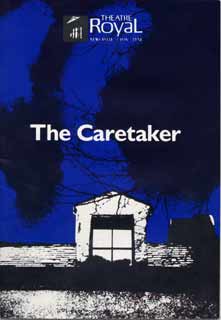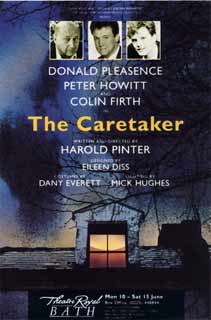
Programme Cover
|
The Caretaker, Tour,
Theatre Royal, Newcastle Upon Tyne, May 1991
Theatre Royal, Bath, June 1991
Comedy Theatre, London, June 1991
Mick - Peter Howitt
Aston - Colin Firth
Davies - Donald Pleasence
Directed by Harold Pinter
Designer - Eileen Diss
Costumes - Dany Everett
Lighting - Mick Hughes
Sound - John A Leonard
Taking care of death in Sidcup
by Benedict Nightingale
If Harold Pinterís 60th birthday has been greeted with
fulsome accolades, envious attacks and revivals galore, it is largely
because of The Caretaker. This was the play that jolted into
life a reputation that appeared to have suffered with the failure
of The Birthday Party. Now we can open any dictionary of
modern quotations and be sure of finding the querulous pleas and
promises Donald Pleasenceís tramp made in Donald McWhinnieís production
in 1960.
Thirty years on, things have changed and not changed. Pinter now
directs, but Pleasenceís Davies again sets up home in the cluttered
attic where the mentally damaged Aston precariously lives, is again
teased by Astonís brother Mick, and again hopes to find salvation
in downtown Sidcup. This is welcome news, because at 70 the actor
is now much nearer the characterís age than in 1960. He catches
an exhaustion, a desolation missing not only form his first own
performance, but from those of Warren Mitchell, Leonard Rossiter,
and the other tramps who have made the play a modern classic.
But wait. Is that to overate it? Well, let us first remember that,
while it has driven academics into ecstasies of torturous interpretation,
Pinterís own gloss has stayed simple. They have compared Davies
with Dionysus, the Wandering Jew, the tempter in an Everyman play,
or Everyman himself. But all Pinter has said is that this is ëa
particular human situation, concerning three particular people.í

Programme Cover, Bath
|
Those campus extravagances are certainly testimony
to a dramatic potency hard to explain. For many grave critics, the
play cannot be the molehill it appears to be, so it must be a mountain
in heavy disguise. But Pinter is correct, as his wilfully dowdy
and downbeat production proves. The play involves perfectly real
people fighting, if surreptitiously and even unconsciously, for
territory, security, status and power. There is not a line in which
the characters are not subtly watching, feeling out, and manipulating
each other. If it is about the awful intricacies of emotional politics.
See the situation from the stance of Mick, a builder
with heady dreams for the flat his brother is ruining, most recently
by importing the smelly, shiftless Davies. The tramp must go ñ but
how? Bully-boy tactics, though helpful in gaining the old cowardís
allegiance, are not enough. No, the answer is to pretend to befriend
him, slyly encourage him to insult his true benefactor, and, when
Aston at last rejects Davies as the greedy, loveless creature he
is, to send him packing is inveigled into evicting himself.
Here as always, it is the just conclusion. Yet Pleasence does win
some grudging sympathy, more than in 1960. Though he can still angrily
punch his palm with his fist, he knows his helplessness, and has
traded some of his old aggression for a studied meekness. The absurd
social pretensions remain, reflected in a Welsh accent which, though
coarsened and hoarsened by bad living and foul weather, has a sing-song
gentility to it. The malice is mutedly there, too. But so is defeat,
emptiness and, in Pleasenceís bulging eyes at the end, even horror.
What is ahead is not Sidcup, but death.
But Pinterís production emphasises the vulnerability of youth as
well as age, casting unusually young actors as the brother. Peter
Howittís Mick might be a leather-clad tough leaving the pub for
a game in Highbury; but there is burning disappointment in him too,
as well as covert affection for Colin Firthís Aston, whose blank
face and flat, dull voice mask a desperate attempt to clamber out
of chaos. The smile they exchange while Davies flounders justifies
John Ardenís remark, that one of the playís subjects is ëthe strength
of the family ties against an intruderí. What can we call so subtle,
suggestive and fascinating a piece but a classic?
The Times, 21st June 1991
|



